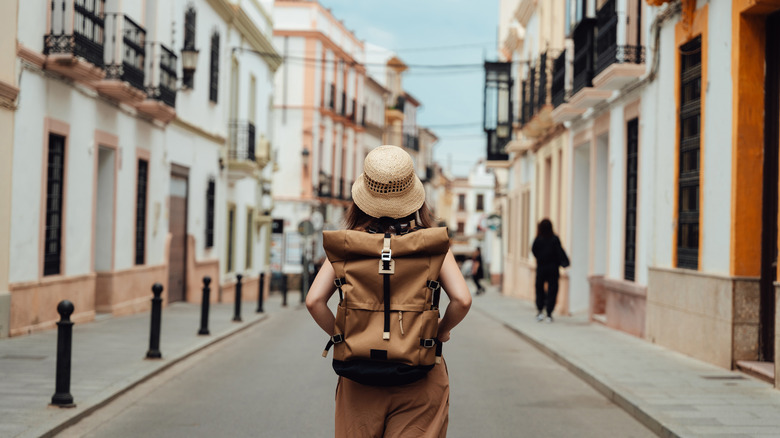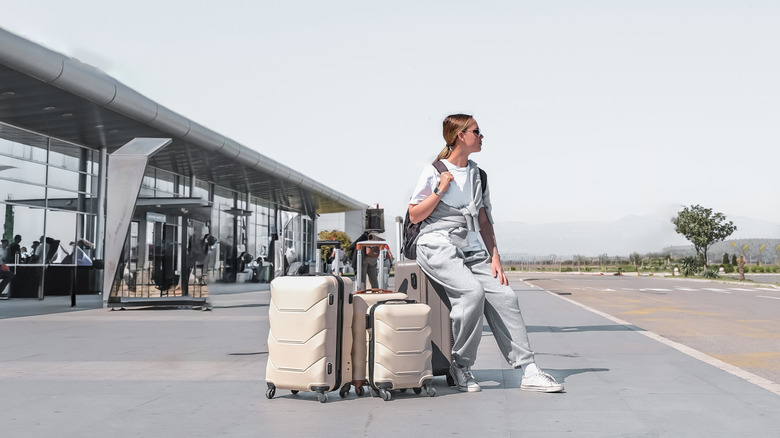The One Personality Trait Women Who Travel Alone Usually Have In Common With Each Other
In her show "Solo Traveling," celebrity host Tracee Ellis Ross gives Rick Steves and Samantha Brown hot competition. The Roku Channel series reveals a candid and intimate look at Ross' life as a solo female traveler, a role the actor has frequently taken on in her personal life. Her trips are elaborate and glamorous, and are already inspiring many a woman to go out and seize adventure on her own. Ross even shared her low-stakes tip to find out if you're the type of person who'll fare well in solo travel. However, according to experts, there's an even more reliable way for women to know whether they're up to the undertaking of a solo adventure: how mentally flexible they are.
According to a 2020 study published in the journal Current Issues in Tourism, those who choose to travel alone are often motivated by the possibility for flexibility and freedom. Not surprisingly, as Clinical Psychologist Dr. Jill Dunbar writes for The Travel Psychologist, women who travel alone often develop psychological flexibility, which means they can adapt to changes in plans without becoming distressed or straying from their values. They avoid disappointment by treating each day as one with a "menu" full of choices for what to do, where to go, what to see, and where to eat. A woman who has multiple ideas for how to enjoy her vacation days can select any combination of these and feel she's had a satisfying "meal." If one option falls through, she's got options for a backup. She might even try some unexpected activity suggested by a stranger that fits right in with her travel tastes.
By leaving herself open to pivoting plans and refusing to stay rigidly fixed on any one itinerary, a woman on the road might wind up having experiences she never could have anticipated, perhaps making her seem bold, adventurous, and even fearless to folks back home. And by embracing psychological flexibility, she's also improving her mental health, according to a 2010 study published in Clinical Psychology Review.
Why successful solo female travelers have psychological flexibility
If you've ever wondered why solo travel can boost your mental health, just know that psychological flexibility is one of the main reasons. It's a core ingredient in Acceptance and Commitment Therapy (ACT), which helps individuals manage stress by learning to be present and adaptable to the world around them. Trips can be unpredictable — at any moment you might have your flight canceled, miss a bus, find yourself overwhelmed by jet lag, realize you forgot something at home ... and the list goes on. The ability to ground yourself and settle on a new outcome, without spiraling because your plans fell through, is important when you're on your own and there's no one there to help lift your spirits. Master this type of skill, and you might even come to enjoy unpredictability — it's like a challenge to be defeated, or a game to be won.
If psychological flexibility isn't a skill you already possess, not to worry! It's like a muscle that has to be developed, and solo traveling is one of the ways you can practice, or "exercise" it. Here's one way how: For every plan A you make while traveling, create two plan Bs that you can fall back on. Better yet, have three plan As, or three different activities you'd like to do fairly equally. When the morning arrives, sit with yourself and ask which you'd like to do most — then go do it. This is a great way to practice being present and not getting too set on any one outcome. It will teach you to trust your own resilience because each time you take on even a small incident in which there's uncertainty and successfully overcome it, you're reinforcing your belief in your own flexibility.

